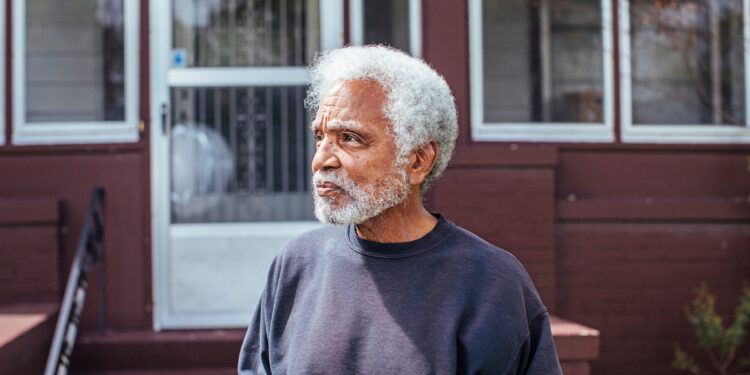Even if he’s not sitting in the unicameral, he’s still educating himself and others about social justice. He’s still on the job, watching, questioning, debating, secure in his rich legacy.
Chambers has taken heat for his contention that anyone born or naturalized in America is a citizen “unless you’re Black.” “Blacks are not full-fledged citizens,” maintains Chambers, using himself as an example. “Yes, I was born here, I served in the military, I pay taxes, I got an education in all these white schools, I did well in all of them and graduated. I went to law school, there was no book I read I didn’t understand, no law I couldn’t find flaws with (if there were any) no provision of the constitution I’m unfamiliar with…But I’m still not a citizen because you have to have special laws so I can vote and then you try to undermine those laws; you have people who want to try to suppress my right to vote.”
It’s a theory he has lived through his 84 years; serving District 11 for 46 years and trying to educate the people of Nebraska about inequality.
Foundations
He was born July 10, 1937, to Lillian and Malcolm Chambers. Two years before he was born, 20 people in the United States were lynched—killed for an alleged offense without a legal trial; the year before his birth NAACP founder William English Walling died. Chambers, the son of a pentecostal church minister, grew up in a “religious strait jacket.” Ever a careful, quiet observer and quick read, he doubted what elders told him after noting their behavior contradicted what they professed. He vowed not to blindly follow or believe others.
“That put in me, from a very early age, a responsibility and obligation to do what I knew or thought, no matter what anybody else said or did,” he said. “And that has stayed with me throughout my life. I do what my conscience tells me what I ought to do.”
When he gained enough insight to realize that actions speak louder than words, he left the church, or, as he said, “I have a Bible verse for almost everything. The verse I thought of for that is from Paul: ‘When I was a child, I thought as a child, I spoke as a child, I believed as a child. When I became a man, I put away childish things.’”
Hypocrisy was easy to identify once the wonder of words opened to Chambers, who, with help from a grade school teacher, overcame early reading-language deficits.
“I became somebody who would pore over things until I thought I had it,” Chambers said. “I would listen carefully to what people said. I learned how to pronounce words by listening to how other children pronounced the words or when the teacher corrected them,” he said. “When I did learn how to read, I was fascinated by insects and animals. They didn’t mistreat each other like people.”
He attended mostly white Lothrop Elementary School, where a young Chambers discovered not all books are friendly towards non-whites. In an interview in January 2006 for Mother Jones, Chambers was quoted as saying, “I was in a class where I was the only Black child, and they sang ‘Old Black Joe’ during the music portion and read The Story of Little Black Sambo and let those little white kids laugh, which children will do because the story is supposed to be funny—it wasn’t funny to me at all.”
Chambers graduated from Omaha Tech High School in 1955 before earning a B.A. in history, with minors in philosophy and Spanish, from Creighton University in 1959.
Following his graduation, he served four years in the U.S. Army, from 1959 to 1963. “In basic training I carried the flamethrower voluntarily. It weighed 68-and-a-half pounds.” After his honorable discharge, he entered Creighton Law School. Despite making the dean’s list, he was denied the chance to complete his studies in a dispute over skipping classes. It would be many years later, under a new school regime, before he was allowed to complete his degree. He never took the bar exam, believing that people should not have to take an exam to enter the profession for which he was already prepared.
Exposure to new ideas led him to interrogate the status quo. Once he found his voice, he used it as a tool and weapon. “I was a skeptic. My life when I was growing up was full of contradictions, full of confusion, full of wondering where can I go to find out how things really are. I didn’t know much about Black history or that Black people had done things because the daily newspaper obviously didn’t carry it, the textbooks didn’t carry it.”
Some adults who noted his gifts introduced him to knowledge beyond school lessons. Buoyed by a growing self-confidence and sense of purpose, he stood up and spoke out against wrong.
“I was a thorn in white people’s side even when I was young,” Chambers said. “As a result, I’ve always been kind of an outsider, and that’s what I am now. I was not afraid to stand alone and do alone what needed to be done. I carried on one-man pickets even then because I felt something needed to be said by somebody publicly from the Black community. But I am my own person. I will follow what I believe. I don’t care what the consequences are. Nobody can compel me or frighten me out of saying what I believe. I’ve gotten death threats. I’ve gotten the usual hate mail, racial slurs, all of it.”
Freedom follows being unafraid, which is why, he said, “For me to do what I’m doing is as natural for me as it is for you to drink water or breathe air.”
He worked construction and odd jobs from high school through college. “Then I worked at the post office (downtown) until I got fired.” Upon being fired he waged a solo protest. Chambers continued, “I’ve never been ashamed or embarrassed to work, no matter the kind of work. If I did honest work and got decent pay for it, then I would do it.”
After graduating barber school, he rented a chair at Spencer Street Barbershop and cut hair for a living. It became a forum for this thought leader and community spokesperson who, with his blend of street and book smarts, polemics and philosophy, led lively discourses on social-political topics. In proprietor Dan Goodwin Sr., he found an ally. “He knew what I stood for and he liked it,” Chambers said. “Saturday mornings we’d go to breakfast. Then, sometimes when I wasn’t cutting hair, I’d come down to the shop, sit around, and just talk to people. Our friendship just blossomed. We saw so many things exactly the same way that people began to think he and I were brothers.”
Hanging with Chambers, who was an FBI target, came with a cost. “Dan got arrested sometimes because he was with me.” After appealing for justice on the radio about the wrongful 1969 police killing of Vivian Strong in Omaha, the two were arrested outside the studio.
Along the way, Chambers also found brotherhood and camaraderie in Omaha Star editor Charles B. Washington, noted for his 1964 interview with Malcolm X for the North Omaha newspaper. In 1964 he and Chambers met the activist when he visited the town of his birth to deliver a talk. Chambers greatly admired Malcolm X. The two men, both preachers’ sons cut from the same ideological cloth, took the opportunity after the event to exchange viewpoints. The next year, Malcolm X’s political career, and life, ended while Chambers’ was getting started.
Taking action and in harm’s way
The barbershop’s intellectual rigor is captured in the 1967 Oscar-nominated documentary A Time for Burning. It lays bare racism through an Omaha church’s failed attempt at interracial fellowship. Chambers appears as the prickly conscience of the piece. The film screened on PBS and prompted a national lecture tour by Chambers.
He misses the shop’s “open line” vents and discussions. “I don’t think it’s just because those were the good old days. What happened there could be called ageless. I think this kind of activity occurred anywhere in the world at any period in history when there was a group disadvantaged in the way Black people are.
“When the 4CL (Citizens Coordinating Committee for Civil Liberties) came into being, a group of us would go with them when they went on demonstrations,” Chambers said. “They knew we didn’t believe in nonviolence. We wouldn’t start anything, but we wouldn’t let anybody do anything to us without doing anything back. We didn’t believe in suffering in silence.”
He became a go-to intervener and mediator for folks embroiled in police matters or public housing issues. He’s credited with trying to calm protestors when civil disturbances erupted in the late 1960s.
“There were times when I was putting myself in jeopardy,” he said. “I had an obligation. The police did not have to tell the truth. All they had to do was say this person did this and so on. They might take him downtown, bust his head, not charge him with anything, turn him loose downtown, and he’d have to struggle back home. This was one of the reasons I was so highly regarded in the community. I would get calls in the dead of night about somebody who’d been taken downtown by the police and if I didn’t go down there we might never see them again. I would get up and go.”
A Life’s Work
Chambers twice ran for elected office before winning his legislature seat the first time in 1971. He represented the community in all but name, so when approached to run, he did. Elected offices in Nebraska then were on an at-large basis with the exception of the legislature. District 11 was the lone public office a Black candidate could realistically win. He later pushed legislation that replaced at-large elections with district elections, which opened the door for Black candidates to win school board, city council, county commissioner, treasurer, and other seats.
“If I had known I would give 46 years of my life to it, I would not have run. If that was the bargain, I would not have taken it. But once I got in, there were things I saw a legislature could do and I tried hard doing them. I got some things done initially. People began to rely on me. I gave them a reason to rely on me.”
He knew well the challenges his district’s residents confronted and the uphill climb to remedy disparity. “I was faced with what mine were facing, but laying all that aside, ultimately it was on me. When I gave that affirmation I did it willingly without mental reservation and I carried through on it.”
Each time he ran, he told supporters he wouldn’t actively campaign: “If you all want me here, you’re going to have to send me here, and that’s what they did.”
He continued, “I carried over from law school a principle that says when you give people a basis for relying on you for something, you’re liable if you don’t carry through. In an ethical or moral sense, I’ve given the people in this community a basis to believe I would do everything I could in that office and I would be in that office as long as they wanted to keep me there. So I stayed.”
He never felt out of touch with constituents.
“Being Black, I know what people are concerned about. I know how hard it is to get or hold a job. I know how fearful Black people have been made. I expected to be standing alone and I wasn’t disappointed. That doesn’t mean everything I did was done on a one-man basis. But by-and-large people in the community were afraid to align themselves publicly with me (for fear of reprisal). Yet if they needed help, I was the first one they came to, and I never turned anybody away.”
Reflections
In looking back on his journey to elder statesman, he sees clearly life patterns, if not details.
“Things just kind of happened helter-skelter. I could not sit down even now and itemize chronologically things that have happened in my life because that’s not the way I live it.”
In taking stock of his career, he does point with pride to model legislation he crafted for the disposition of Native American remains and the divestiture of public funds from then-apartheid South Africa. He blocked an attempt by Republican state senators to return Nebraska’s electoral votes to a winner-take-all-system, thus making it possible for the congressional district that includes largely Democratic Omaha to award a delegate vote to Joe Biden despite the rest of the state voting Trump. He accepts, too, “all the failures I’ve had in the legislature as others reckon failure—how I couldn’t get for poor people what was needed, not only in terms of material things like food, shelter, clothing, health care, but the feeling of dignity and respect.”
His humanitarian efforts extended to non-Blacks, including Carey Dean Moore, a death-row inmate he tried saving from execution as part of a long battle he waged to outlaw the death penalty here.
“I couldn’t keep off the books the death penalty. Many things in the legislature I failed to make come out the way I wanted them to come out. But if I did the best that I could, then to my reckoning, I was a success. Things outside of me do not determine what I am or what I am not. If that friend deep down inside of me, the only friend I’ve got, tells me, well done, then I can sleep the sleep of the just. That’s the way I live.”
The death penalty was abolished in the state in May 2015, then re-established by voters in 2016.
If there’s anything he’s learned in his purpose-driven life, it’s to be authentic. “It might sound philosophical, it might sound naive, but everybody should try to establish an inner set of values. Always be true to yourself, trust your judgement, never give up, never quit, and be what you are.”
He’s aware of his enigma status, but rejects it as a false narrative. “I am as transparent as a piece of window glass and as uncomplicated as a straight line. There’s nothing hidden, no sub-rosa, what you see is what you get. But when you see what is really there, you may get something you don’t like—as often happened in the legislature. But when one of them needed help, even those who dealt treacherously with me, if I felt it was for the good of the legislature or the people’s interests or the integrity of the process, then I would help rewrite bad legislation.”
He made friends and enemies. Building alliances and engaging in disputes came with the territory.
“There is no sanction a human being can bring against me that I fear so much that it will turn me away from what I believe I ought to do,” Chambers said.
Nothing’s changed, he insists, now that he’s out of office again, perhaps for good. “What I am now is just an older version of what I’ve always been.” He’s comfortable in his own tough skin and in the uncompromising example he’s set.
“Not one of you could stand in the way that I’ve stood all these years. Not one of you could get out of bed every day and know that you’re outnumbered more than 45 to 1 and stand as I have, not yield an inch, not sacrifice a principle, fight as hard for vicious white people as for the most virtuous Black person when that white person is being mistreated and not being granted the rights he or she should have under the law.”
He’s helped education through legislation. Chambers got a requirement passed for Nebraska schools to have multicultural education, and in the 1980s spoke out about paying athletes, something he reiterated in an interview he gave to NET in April. He likened athletes to indentured servants, saying they aren’t in college to be scholars, but athletes, and they are not paid for it although athletes make money for colleges.
Even if he’s not sitting in the unicameral, he’s still educating himself and others about social justice. He’s still on the job, watching, questioning, debating, secure in his rich legacy while aware of his disenfranchised status. His retains his voracious reading habits.
“Even to this day, I read newspapers skeptically,” Chambers said. “I listen to the news analytically. I don’t trust people in the legislature when they say things. When the governor speaks, I believe he has a hidden motive. I believe judges will disregard the law and make a decision based on who the person is standing in front of the judge. People are arrested because of what they are, not what they’ve done.”
Ernie Chambers, the everyman’s champion, sees that education is key to revealing the truth; and that truth will set people free.
Search “Ernie Chambers” on Facebook or Twitter for more information.













